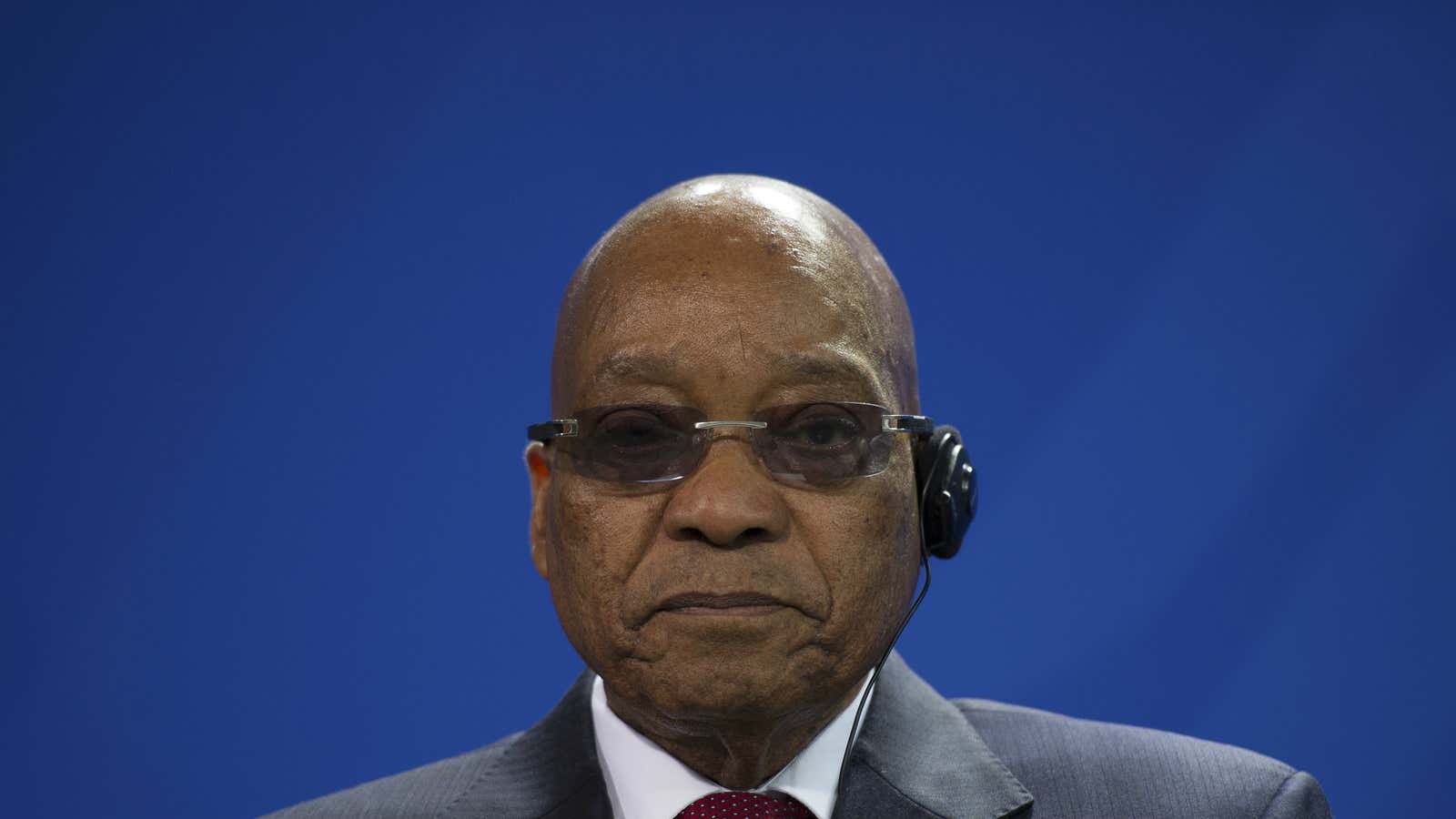South African president Jacob Zuma abruptly fired his finance minister Nhlanhla Nene yesterday (Dec. 9). He was replaced by David Van Rooyen, a relative unknown lawmaker with little experience in government. The episode heaps more uncertainty onto an already faltering economy.
Nene was finance chief for only 18 months, and the government provided no immediate explanation for his removal. In his announcement, Zuma simply said that Nene would be moved to a new role, but did not specify which role that will be. “I have decided to remove Mr Nhlanhla Nene as minister of finance, ahead of his deployment to another strategic position,” Zuma said in a statement.
Last week, two of the three major credit ratings agencies downgraded South Africa to just one notch above “junk” status, citing over-spending, declining business confidence, and weak economic growth as justification. The removal of Nene as finance minister has analysts fearing further downgrades. He was widely respected by investors.
“We can ill afford to antagonize international investors,” Mohammed Nalla, head of strategic research at Nedbank, told Bloomberg. “An event of this magnitude can even be the catalyst for a credit rating downgrade to junk status.” Indeed, Standard & Poor’s has said that it is “watching very carefully” for signs of a looser fiscal policy under Van Rooyen.
Meanwhile, South Africa’s Chamber of Commerce and Industry (SACCI) implored Zuma to explain himself. “We are looking forward to the president sharing the motivation for this decision with the business community as a matter of priority,” Alan Mukoki, SACCI’s CEO, said today.
Upon the announcement of Nene’s firing, the rand declined to its lowest level against the dollar in four years and the sharpest one-day fall since 2008, according to Bloomberg. Overall, the rand has lost 25% of its value against the dollar so far this year.
Van Rooyen is a parliamentary backbencher who has served on committees with finance portfolios. He was also once mayor of Merafong, a municipality near Johannesburg with a population of less than 200,000 people. His lack of finance experience is balanced by deep political ties—he has held various leadership positions within the ruling ANC party, including as a member of the party’s military wing during apartheid. His appointment seems driven by political instead of economic concerns.
Nene was perceived as an independent figure within the government. He was a vocal critic of Zuma’s spending decisions, particularly the plans to bail out struggling South African Airways and invest in an expensive nuclear-energy project. This may have precipitated his downfall.
“Nene’s replacement is a sign that South Africa has reached a tipping point in which politics have begun to firmly trump economics in the president’s decision-making,” Anne Frühauf, senior vice president at consultancy Teneo Intelligence, wrote in a note to clients. “Nene had already battled hard to contain spending pressures ahead of the 2016 budget.”
The finance ministry, considered one of the less politicized arms of government, may now become a fully-fledged political tool of Zuma’s administration. Van Rooyen’s political background suggests that he may be more open to Zuma’s spending choices. ”Zuma would expect van Rooyen to play the role of a malleable minister, rather than the hard-nosed bargainer who has the president’s license to keep other ministries and provinces in check,” says Frühauf.
“We have long pointed to the weakening political strength of the Treasury,” Mark Rosenberg, an analyst at Eurasia Group, told the Financial Times (paywall). “This reshuffle is a step further and faster than we expected.”
